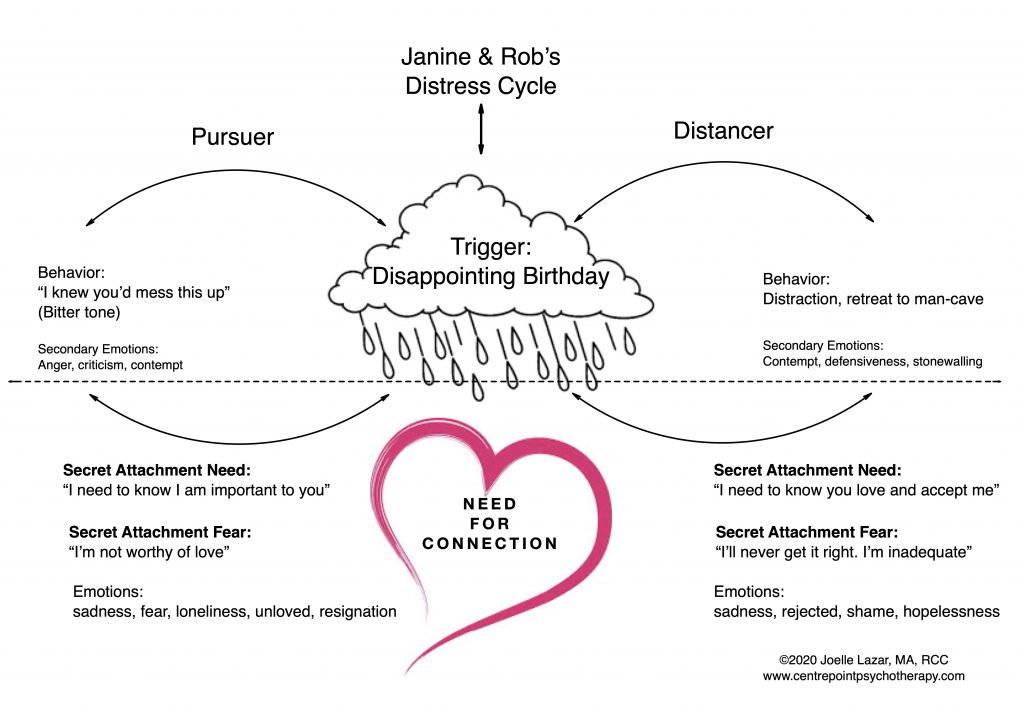The enemy is not your partner, it’s the distress cycle.
It causes those unsettling doubts about whether your relationship is a forever home. It drives fear that your partner is incapable of loving and accepting you for who you are. It’s your distress cycle with your partner, and it feels like being in deep water with hungry sharks circling around.
Over time relationships dominated by the distress cycle pickle partners in a brine of stress hormones and inflammation that can even disrupt heart and immune function.
Emotion-Focused Therapy (EFT) helps couples to defuse reactivity, and rebuild the closeness and connection they so deeply want with one another.
Janine slumps in her chair, arms crossed and jaw tight. She laments that once again her husband, Rob, has done what he always does – fail to support her.
“Doesn’t he get it yet? Will he ever get it? He never listens! On the totem pole of his priorities, I am at the very bottom!”
“That’s right,” says Rob, his voice bitter, “Congratulations, Janine. You’ve done it again. I now join the ranks of everyone else in your life who has failed you. I just can’t win. No matter how hard I try, it’s never enough for you.” Rob says as he turns away, and wilts in his chair.
As I sit with this couple I begin to feel as much despair as they do.
Pursuers and Distancers: The Pedal to the Medal of the Marriage Distress Cycle
Fortunately the language and process of EFT Therapy for couples is invaluable for separating couples like Janine and Rob from the train wreck trajectory which is their distress cycle.
In EFT language, Janine is the “Pursuer” – she pursues Rob’s support by highlighting how he’s failed her. Janine’s criticism sounds the alarm bell, and Rob lashes back with contempt. He then becomes what in EFT we call the “Distancer”.
Both Pursuer and Distancer strategies keep painful unmet needs and longings in the emotional fortress.
Perceptions, thoughts, memories, expectations, and interpretations filter events with our partner through a prism of unmet needs. These interpretations are distorted beliefs about ourselves and our worth based on losses or attachment failures in previous relationships.
“Wow.” I say my voice heartfelt, “This distress cycle is so painful for both of you. You keep missing each other, and the harder you try to reach one another, the further and further apart you feel. You are in the right place. Let’s look at the nuts and bolts of this distress cycle. You are not each other’s enemy – the distess cycle is the enemy.”
Beware of the Four Horsemen of the Apocalypse
A couple’s distress cycle is often characterized by what the Gottmans, husband-wife duo and couples therapy Gurus, refer to as the Four Horsemen of the Apocalypse: 1. criticism, 2. contempt, 3. defensiveness, and 4. stonewalling. These suspects are frequent visitors in couples distress cycles, and can erupt over relatively innocuous triggers. Recall lame fight over which Netflix show to watch that soured a whole evening.
Distress cycles damage trust and security in a relationship, and are incredibly draining and discouraging. In EFT we help couples to map out their distress cycle, clarify their emotional signals, and articulate their needs in a way that deepens understanding, compassion and empathy.
In my personal life, I am no stranger to the distress cycle. Over our 15 year relationship, my partner and I have weathered an impressive procession of stressors – two children with learning and behavioural challenges, financial pitfalls, and extended family upping the emotional ante. I KNOW defeating a distress cycle is hard. I’ve bushwacked my way through it too many times!
Tracking the Trigger
“Ok guys,” I say, “Let’s look at the triggering event that has the two of you feeling so hurt and polarized…”
Janine tried to convince herself that her birthday wasn’t a big deal, and that she didn’t want or need anything special. But deep down, Janine vied for Rob to do something magnificent that would sweep her off her feet, and quiet the sting of her attachment fear: “If I was worthy of love, you’d make more of an effort”.
As Janine’s birthday approached, Rob felt more anxious. “She is so hard to please. No matter what I do, it won’t be good enough.”
Thoughts like these flashed through his mind, and undermined his confidence. In response, Rob’s strategy was to distract himself as much as possible. Not surprising that a meaningful birthday gesture did not emerge from his distracted cloud – more evidence that procrastination ultimately manifests the failure that we fear!
In our session, I put Janine and Rob’s distress cycle on the white board to help them track it. I helped them to analyze the trigger that preceded their distress cycle. For Rob it was when Janine said, “I knew you’d mess this up” with a tone of bitter disappointment. Rob’s perception was that Janine had given up on him.
Feeling hurt and abandoned, Rob retreated to his man-cave to distance from Janine, and from his secret attachment fear: “I’ll never get it right. I’m inadequate”.
Repairing & Nurturing the Bond
The beautiful moment occurred after we dipped into Janine and Rob’s secret attachment fears and longings. Janine saw a soft, expectant look in Rob’s eyes. I asked Rob to put the expression in his eyes into words. “I was so scared to let you down, Jani” he said. “What’s that like to hear, Janine?” I asked. “It makes me want to cry.” she said reaching for his hand. “Just knowing how much I mean to you is such a relief!” she said.
EFT helps couples get relief from the stressful cycle that sabotages their closeness. Vulnerable attachment needs and fears underlie reactivity and retreat. Triggers are the tip of the iceberg. What couples don’t see is what’s underneath: previous attachment injuries and losses stuck like glue to distorted beliefs about self worth. Accompanied by a skillful EFT therapist, Pursuers and Distancers learn to step back, and communicate their attachment needs in a way that nurtures trust, closeness, and security.


